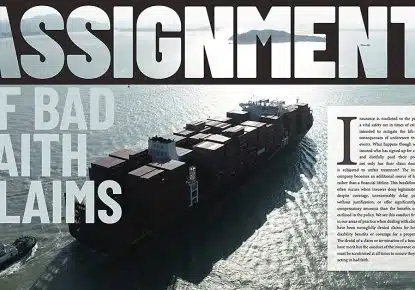Why Insurance Companies Deny Water Damage Claims: Understanding the Reasons
Water damage can be a devastating experience for homeowners and businesses alike. Whether it’s from a burst pipe, a leaking roof, or a flood, the aftermath often involves significant costs and disruptions. In such times of distress, many turn to their insurance policies for financial relief, only to find their claims denied. At Singer Katz LLP, our knowledgeable water damage insurance claim lawyers, can help. Understanding why insurance companies deny water damage claims can shed light on this complex issue and help individuals navigate these challenges more effectively.
1. Policy Exclusions and Limitations
One of the primary reasons for denial is that the specific cause of water damage may not be covered under the policy. Insurance policies typically outline specific exclusions—such as damage caused by floods, gradual leaks, or lack of maintenance—that may render certain types of water damage ineligible for coverage. For instance, if a policy excludes flood damage and the water damage resulted from a flood, the claim would likely be denied. Water damage exclusions and coverage enhancements can be extremely difficult to understand.
2. Failure to Maintain Property
Insurance companies expect homeowners and property owners to take reasonable steps to maintain their properties. If water damage occurs due to neglect or lack of maintenance—for example, not fixing a leaking roof or failing to repair faulty plumbing—the insurer may argue that the damage could have been prevented with proper upkeep. In such cases, claims may be denied based on the assertion that the damage resulted from the homeowner’s failure to fulfill their responsibility.
3. Policy Conditions Not Met
Insurance policies often include specific conditions that policyholders must meet to qualify for coverage. This might include promptly notifying the insurance company of the damage, providing accurate documentation, or taking steps to mitigate further damage. If these conditions are not met, insurers may deny the claim on the grounds that the policyholder did not fulfill their obligations under the contract.
4. Coverage Limits and Deductibles
Even when water damage is covered under a policy, there are usually limits to the amount of coverage provided. If the cost of repairs exceeds these limits or if the deductible is higher than the repair costs, the insurer may deny the claim or only partially cover the expenses. It’s essential for policyholders to understand their coverage limits and deductibles to avoid surprises when filing a claim.
5. Misrepresentation or Fraud
Insurance companies investigate claims thoroughly, especially when they involve significant amounts of money. If there is any suspicion of misrepresentation or fraud—for example, providing false information on the insurance application or exaggerating the extent of the damage—the insurer may deny the claim and potentially pursue legal action against the policyholder.
6. Gradual Damage vs. Sudden and Accidental Damage
Insurance policies typically cover sudden and accidental water damage, such as a burst pipe. However, gradual damage—such as long-term leaks that eventually cause damage—is often excluded. Determining whether the damage is sudden and accidental or gradual can be contentious, and insurers may deny claims if they believe the damage occurred gradually over time rather than suddenly.
7. Disputes Over Cause and Responsibility
In some cases, there may be disputes between the insurance company, policyholder, and possibly third parties (such as contractors or other insurers) regarding the cause of the damage or who is responsible for covering the costs. These disputes can delay or complicate the claims process and may result in denial if the parties cannot reach a resolution.
What Can Policyholders Do?
Dealing with a denied water damage claim can be frustrating and stressful, especially when facing the financial burden of repairs. Here are some steps that policyholders can take to potentially resolve issues and improve their chances of a successful claim:
- Review Your Policy Carefully: Understand what is covered and any exclusions or limitations that may apply to water damage.
- Document Everything: Keep detailed records of the damage, including photos, videos, receipts, and communication with the insurance company.
- Mitigate Further Damage: Take reasonable steps to prevent further damage to your property.
- Seek Professional Help: Consider consulting with one of our experienced property insurance lawyers to navigate complex issues and disputes.
Conclusion
While insurance companies provide valuable protection against unforeseen events like water damage, their denial of claims can be disheartening. Understanding the reasons behind these denials—such as policy exclusions, maintenance issues, and coverage limitations—can help policyholders better prepare and advocate when filing claims. By being proactive, documenting thoroughly, and seeking professional guidance when needed, individuals can increase their chances of a fair and favorable resolution to their water damage claims.
If you have questions about your property insurance claim, contact us for your free consultation.








